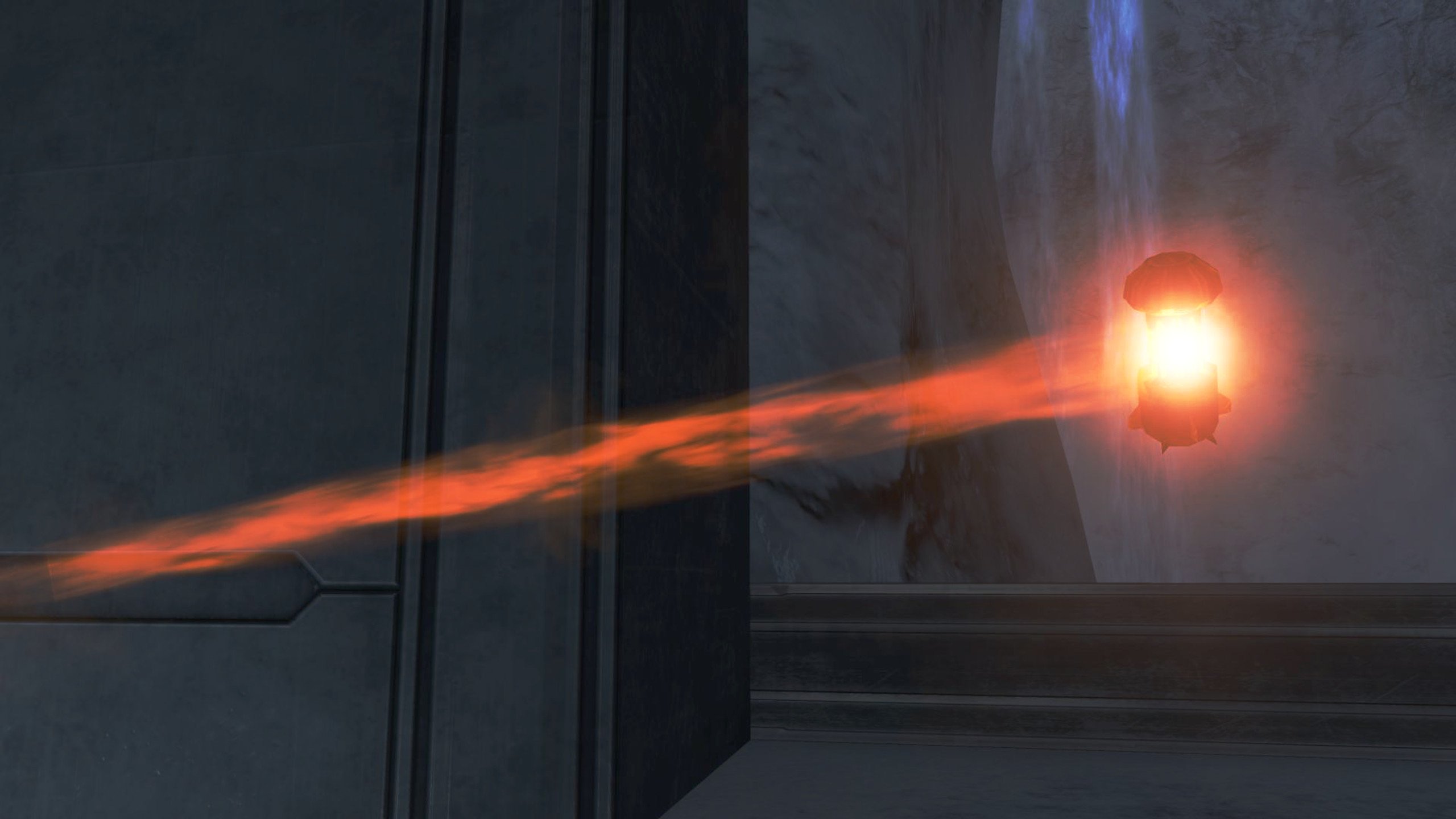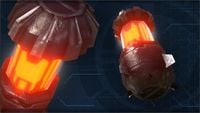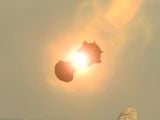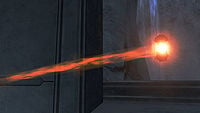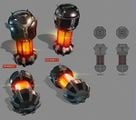Orgudam Workshop firebomb
From Halopedia, the Halo wiki
| Orgudam Workshop Firebomb | |
|---|---|
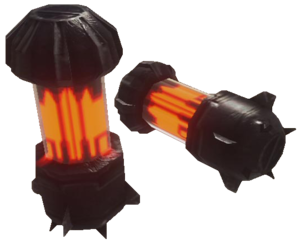
| |
| Production overview | |
|
Manufacturer: |
|
|
Type: |
|
| Specifications | |
|
Length: |
30.8 centimeters (12.1 in)[Note 1] |
|
Weight: |
|
|
Filling: |
Incendiary gel which burns when it contacts oxygen[2] |
|
Damage radius: |
|
- "It sure don't seem like it was meant for burnin' material, seems more like it was meant for burnin' personnel."
- — Anonymous E2-BAG/1/7 serviceman[3]
The Orgudam Workshop Firebomb[1] (UNSC Type classification: Type-3 Antipersonnel/Antimaterial Incendiary Grenade, T-3 A/AIG) is an incendiary grenade developed by the Jiralhanae.[3][2] The weapon is often colloquially shortened to other nicknames such as Incendiary Grenade, Firebomb, and Flame Grenade.[4] In some usage, the weapon is nicknamed a Molotov.[3]
Overview[edit]
Design details[edit]
The Firebomb is a multi-purposed infantry explosives munition, and can be thrown 10 meters by the average soldier. The incendiary gel filling contains pyrophoric alkali metal Caesium chemical compound, a stable yet hazardous chemical compound that was developed by the Jiralhanae. Upon impact with a hard surface, the casing converts to liquid form, burning at around 2200 °C (3992 °F), and causing significant damage to vehicles and infantry alike, automatically killing all nearby infantry in a 4.7 meter (15.5 foot) radius.[2] The stable caesium mixture filler also escapes from the burning casing, splashing over nearby objects and causing significant damage as it burns for 4.5 seconds. The Jiralhanae have, however, employed variants that burn for longer.[2] The flame emitted by the grenade is so intense, it is potentially hazardous to a human retina.[3]
The toxic nature of caesium renders human flesh inedible to Jiralhanae.[2]
Development history[edit]
The Firebomb was first developed by the Jiralhanae on their homeworld, Doisac.[2] It was originally designed by Orgudam Workshop with an emphasis on its potential psychological impact alongside any material damage dealt,[1] though by the final months of 2552 sole production of the weapon had been shifted to the Sacred Promissory—an organisation within the Covenant tasked by the Prophet of Truth with construction of weapons for the Brutes.[2][1]
Jiralhanae flame grenades were frequently captured by United Nations Space Command personnel during the Human-Covenant War, though the human troops were generally hesitant to use them due to their experiences at the receiving end of Brute-thrown Firebombs.[4] However, the grenade was one of many pieces of equipment detailed in the report Machines, Materiel and Munitions from the Human-Covenant Conflict, 2525 - Present.[3]
UNSC Remarks[edit]
The following are observations of the Type-3 Incendiary Grenade from servicemen of the UNSC Marine Corps unit E2-BAG/1/7:
- "The filler seems to be a liquid or a gel or something; it dissipates pretty rapidly under water—I don't know how it would behave in hard vacuum."
- "It doesn't burn under water, unless it's already on something and burning. A "thermite", otherwise heat, grenade will burn under water and that crap has been around forever. Hey, is it just me or does Brute tech seem to be all over the map? Either there's no info sharing on Brutonia or something bad happened."
- "Baby Kongs use 'em exclusively as AP grenades. Kongs tend to capture or abandon material more often than they deny it."
- "None of the other alien foxtrots use 'em. Either the bravo kilos don't trust 'em with 'em or the rest of 'em ain't as keen on burnin' folk as kilos are."
In-game information[edit]
The incendiary grenade appears in Halo 3 and Halo 3: ODST. The incendiary grenade has no detonation time, so it will ignite instantly when coming into contact with either enemies or structures.
In campaign, they are typically carried and used by Jiralhanae Stalkers. Firebombs generate a small explosion if shot while active and in any occasion, instead of a pool of fire. They must be ignited prior to impacting a surface to create the pool of fire. The incendiary grenade is the only grenade that can "stick" on to Jiralhanae Chieftains and War Chieftains. This feature makes the grenade arguably one of the most effective ways to deal with Chieftains; however they will have no effect when used against Chieftains with active Invincibility. The incendiary grenade is very effective against the Flood, even if the grenade only contacted the ground they are standing on; one can kill up to three Flood combat forms or Flood pure forms in a close group, even ones as large as Tank forms. Furthermore, when stuck to a Flood carrier form, the resulting fire will burn it completely, and it won't release any pod infectors as a result.
In multiplayer, killing someone with this grenade will award the player with the Incineration Medal. It does not appear by default on any Multiplayer map, nor does it regenerate using the "Grenade regeneration" option. They are only available if they have been previously added in Forge.
Production notes[edit]
There were three potential designs for an incendiary grenade of Jiralhanae origin during the development of Halo 2. The first design's main body has a grid pattern that glows red-orange when the grenade is active, with an elongated handle with wrapping; this likely became the cut Halo 2 iteration of the spike grenade. The second resembled the final Halo 3 design of the firebomb, featuring an iridescent glass center and chromed ends with probes that emit flares after being thrown. The third design resembled a large bone, with cast-aluminum finish and caps on either end that emit sparks and light when the grenade is thrown.[5]
Gallery[edit]

|
Browse more images in this article's gallery page. |
A pair of Incendiary grenades in Halo 3.
Halo Online concept art of the Firebomb.
List of appearances[edit]
- Halo 3 (First appearance)
- Halo 3: ODST
- Halo Legends
- The Package (HUD icon only)
- Halo: Last Light
- Halo: Divine Wind
Notes[edit]
- ^ In the original Bungie.net article on the Firebomb, the o/a length of the grenade is listed as 30.5cm (12in), while in the 2009 Halo Encyclopedia it is more specifically listed at 30.48cm. The measurements used on this page are those consistently provided in the Essential Visual Guide and 2022 Halo Encyclopedia.
Sources[edit]
- ^ Jump up to: a b c d e f Halo Encyclopedia (2022 edition), page 306
- ^ Jump up to: a b c d e f g h i Halo: The Essential Visual Guide, page 68
- ^ Jump up to: a b c d e f Bungie.net, Incendiary Grenade (Retrieved on Jan 31, 2021) [local archive] [external archive]
- ^ Jump up to: a b c Halo Encyclopedia (2009 edition), page 333
- ^ The Art of Halo, page 115
| ||

